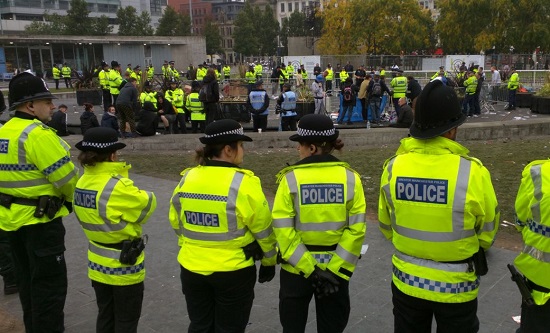Salvaging the myth of ‘policing by consent’
On 27 February 2025, the Metropolitan Police published the ‘Stop and Search Charter’. This charter was implemented at the recommendation of the Casey Review, published in 2023, which lambasted the Metropolitan Police for its institutional racism. Stop and search was described as a ‘racialised weapon’. Between 2016 and 2023, black people between ages 11 and 61 were 3.5 times more likely to be stopped and searched, 4.5 times more likely to have a baton used against them and four times more likely to be tasered than white people.
The charter is a series of ‘commitments’ from the Met around: ‘the quality of encounters’; training; increased supervision and scrutiny; handling complaints; the use of technology; ‘community involvement’; and better ‘public understanding’ of stop and search. Ostensibly, this charter will reform the way stop and search is used and improve community relations between the police and the community.
In reality, the charter is simply a series of non-binding promises by the Met to make police harassment more palatable to the general public and restore the liberal myth of ‘policing by consent’. It will not change the nature of policing under capitalism – a way to discipline, control and repress the working class, especially black people. A 2023 YouGov poll found that over half of ethnic minority Londoners do not trust the Met. The ruling class clearly recognises that the conduct of the police risks provoking uprisings of the scale seen in 2011.
British police, sexist police
On 11 April, the High Court ruled that police officers accused of violence against women, including rape and domestic violence, can’t be sacked simply as a result of having their vetting clearance removed, frustrating Met Commissioner Mark Rowley’s initiative to clean up the Met’s image by targeting ‘rogue officers’. Sergeant Lino Di Maria had multiple allegations against him including domestic violence, indecent exposure, rape and sexual harassment and had his vetting clearance removed in September 2023. Backed by the Metropolitan Police Federation, he took the decision to court and won. Prior to this, under Rowley’s initiative, 96 officers had been sacked or resigned in the last 18 months.
Ultimately, whether successful or not, such initiatives will not change the sexist nature of the police. Between 2013 and 2020, there were on average 60 allegations of serious sexual misconduct made against on duty Met police officers per year. On 15 April another Met police officer, and he is only one of very many, was jailed for rape. Nor is this confined to the Met: figures from the National Police Chiefs’ Council showed that between October 2021 and April 2022, over 1,500 serving police officers nationally were accused of violence against women and girls. The culture of British policing is violent and misogynistic because that is the nature of the economic system the police protect.
Two-tier justice on its head
On 5 March the Sentencing Council published new guidelines for judges in relation to the ‘Imposition of Community and Custodial Sentences’. Included in the guidelines were details of when a criminal court should request that probation officers produce a Pre-Sentence Report (PSR) on a convicted person before they are sentenced. In addition to reiterating existing practice that requires a PSR in order to properly assess dangerous offenders, the guidelines suggested that it would be appropriate to request one for a wide range of different groups, including: women in general and pregnant women in particular; young people; those convicted for the first time and people ‘from an ethnic minority, cultural minority, and/or faith minority community’.
Right wing social media then exploded into paroxysms of rage about ‘two-tier justice’, which was quickly capitalised on by rabid Tory Shadow Home Secretary Robert Jenrick, who put forward a Private Members’ Bill to Parliament with the aim of giving the Home Secretary the power to veto sentencing guidelines. Not to be outdone, Labour Justice Secretary Shabana Mahmood came back with her own Sentencing Guidelines (Pre-sentence Reports) Bill, which is now going rapidly through the parliamentary stages to become law. The Bill says explicitly that ‘sentencing guidelines about pre-sentence reports may not include provision framed by reference to different personal characteristics of an offender… in particular (a) race; (b) religion or belief; (c) cultural background’.
In reality, against the background of an exploding prison population, the timid guidelines only sought to make a small step towards achieving some kind of equality before the law for racialised groups who continue to face entrenched institutional racism in relation to police profiling, arrests and court outcomes. A 2023 report by the Prison Reform Trust stated that ‘Over a quarter (27%) of the prison population, 21,537 people, are from a minority ethnic group. If our prison population reflected the ethnic make-up of England and Wales, we would have over 9,000 fewer people in prison – the equivalent of 12 average-sized prisons.’
Kotsai Sigauke and Nicki Jameson
FIGHT RACISM! FIGHT IMPERIALISM! 306 June/July 2025




